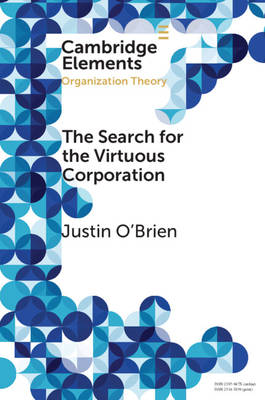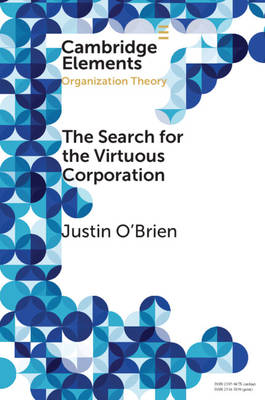
- Afhalen na 1 uur in een winkel met voorraad
- Gratis thuislevering in België vanaf € 30
- Ruim aanbod met 7 miljoen producten
- Afhalen na 1 uur in een winkel met voorraad
- Gratis thuislevering in België vanaf € 30
- Ruim aanbod met 7 miljoen producten
Zoeken
The Search for the Virtuous Corporation
A Wicked Problem or New Direction for Organization Theory?
Justin O'Brien
€ 31,95
+ 63 punten
Omschrijving
The corporation is the most complex, adaptive, and resilient model of organizing economic activity in history. In an era of globalization, the transnational corporation has significant power over society. While its rights are specified through private ordering, and choice of jurisdictional home, in the event of conflict of laws, the corporation's duties and responsibilities remain contested. Notwithstanding the argument in institutional economics that all transactions take place within governance and legal frameworks, underpinned by a 'non-calculative social contract, ' the terms are notoriously difficult to define or enforce. They are made more so if regulatory dynamics preclude litigation to a judicial conclusion. This Element situates the corporation - its culture, governance, responsibility, and accountability - within a broader discourse of duty. In doing so, it addresses the problem of the corporation for society and the corporation's problem in aligning its governance to changing community expectations of obligation.
Specificaties
Betrokkenen
- Auteur(s):
- Uitgeverij:
Inhoud
- Aantal bladzijden:
- 75
- Taal:
- Engels
- Reeks:
Eigenschappen
- Productcode (EAN):
- 9781108969222
- Verschijningsdatum:
- 25/11/2021
- Uitvoering:
- Paperback
- Formaat:
- Trade paperback (VS)
- Afmetingen:
- 152 mm x 229 mm
- Gewicht:
- 104 g

Alleen bij Standaard Boekhandel
+ 63 punten op je klantenkaart van Standaard Boekhandel
Beoordelingen
We publiceren alleen reviews die voldoen aan de voorwaarden voor reviews. Bekijk onze voorwaarden voor reviews.











